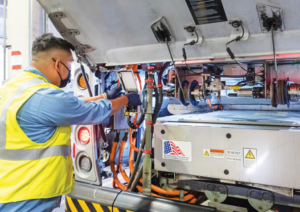Low-No Emission Workforce Transition Resources
Low-No Emission Workforce Transition Resources
Preparing Frontline Technicians
Transitioning from work with the 12- and 24-volts electrical systems in traditional diesel and CNG buses to Low-No Emission Buses requires a significant commitment to additional skills training and development. Transit Workforce Center is producing critical resources to help prepare frontline technicians with the training needed to meet the challenges and demands of this new technology.
Low-No Emission Bus Maintenance Training Materials
TWC has released a complete training course to supply agencies with ready-to-use materials to familiarize technicians with Low-No Emission Bus maintenance, technology, and safety fundamentals. The product includes classroom materials, instructional videos, hands-on exercises, and assessments that prepares technicians for product-specific training offered by bus manufacturers. Based on Low-No Emission Bus resources developed by the International Transportation Learning Center (ITLC) in coordination with major bus manufacturers, this course provides technicians with a foundational understanding of Low-No Emission Bus technology.
National Low-No Emission Bus Maintenance Training Standards

TWC worked with the American Public Transportation Association (APTA), local transit agencies, transit labor unions, and Low-No Emission Bus manufacturers to facilitate discussions among subject matter experts (SMEs) on the training needed for Low-No Emission Bus technicians and to develop Maintenance Training Standards. These standards outline the training necessary to obtain the essential knowledge, skills, and abilities to perform maintenance and diagnostic tasks safely.
Resources and Best Practices for a Low-No Emission-Workforce Fleet Transition Plan
FTA’s website contains a set of workforce development resources agencies can refer to when planning and carrying out transitions to new bus fleet technology. Those resources, including materials gathered and developed by TWC, can be found here.




